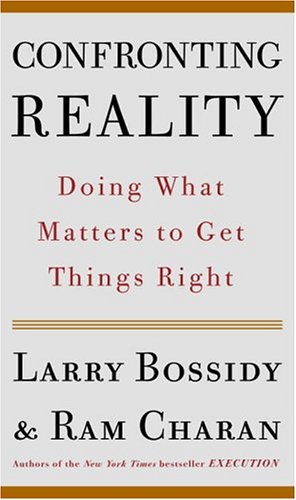 |
||
|
|
Join
The Miami Herald's Business Monday Book Club.
Click here for information.
Music Reviews and Features
Dion Dimucci
Lester Bangs in "Almost Famous"
History of Warner Brothers Music
Food & Dining
Creolina's
Cajun/Creole
Confronting Reality: Doing What Matters to Get Things Right. Larry Bossidy and Ram Charan. Crown Publishing. 288 pages. (Also unabridged on a five-CD set from Random House Audio.)
BY RICHARD PACHTER
rpachter@wordsonwords.com
One is struck by the oddness of many business
books. Quite a few of these no
doubt well-intentioned manifestos seem to take place in alternate realities
or parallel universes where systems are far more orderly and behavior
more predictable than on Planet Earth.
The chaos, ambiguity, venality and mindlessness one encounters in the workplace -- with oases of thoughtful competence, of course -- seems wholly foreign to many of these purveyors of commercial wisdom. Still, quite a few of their treatises are devoured by those seeking a glimpse into a world where complicated problems are readily solvable and dazzling success is merely a matter of doing the right thing repeatedly.
In their previous book Execution, authors Larry Bossidy, the former CEO of AlliedSignal, and consultant Ram Charan made the somewhat obvious but no less profound point that where most businesses fail is in actually doing what they should do as opposed to merely having the best of intentions and then failing to follow through.
I quite liked Bossidy and Charan's last book, and this one is as good if not better.
The authors contend that far too many decisions are made emotionally, intuitively or by habit -- ''That's just how it's done'' -- but not realistically.
It might be painful, for example, to relocate a manufacturing operation to China, and there may be political, social and moral concerns about such a move. But if the manufactured item has been turned into a commodity, and productivity and cost-cutting measures have proved insufficient, there maybe no other choice than moving or selling the operation.
That's the ''reality'' the authors speak of: making choices based on an accurate reading of the situation and its implications.
For example, they write: ``The most widespread unrealistic behavior when the game changes drastically is to violate the First Law of Holes (when you're in one, stop digging). People redouble their efforts to do what they know best. They often achieve heroic results -- which are, alas, almost as often pointless, because they fail to confront the new realities. In theory, confronting reality is what business is all about.
``More than most, business people like to think they're realists. Their actions look like realism. They work hard to gather relevant facts and data, they research alternatives rigorously, and they bring their cumulative knowledge and experience to bear on the issues. They test their thinking in arguments and debates. Then they reach conclusions. Surely, after all this work, the conclusions are realistic.
``But the implicit faith in realism is all too often unjustified. The best strategies, the most rigorous research, the clearest of operating plans -- all are undermined because the key people behind them have missed the reality of the situation for one reason or another. The fact is that the greatest consistent damage to businesses and their owners is the result not of poor management technique but of the failure, sometimes willful, to confront reality.''
Bossidy and Charan's preferred tool for assessing whether one's company is operating on Earth or Shangri-La is the business model. To that end, they offer a model of a business model, but they stress that each model must be specific to an enterprise and repeatedly checked and revised.
I alernately read and listened to the unabridged audio version of this book, which was quite competently recited by actor Kevin Gray. While its production is hardly innovative, I was able to confront the reality of traffic on I-95 while listening to it, so apparently that business model was a sound one.
Like business books? Join the club.